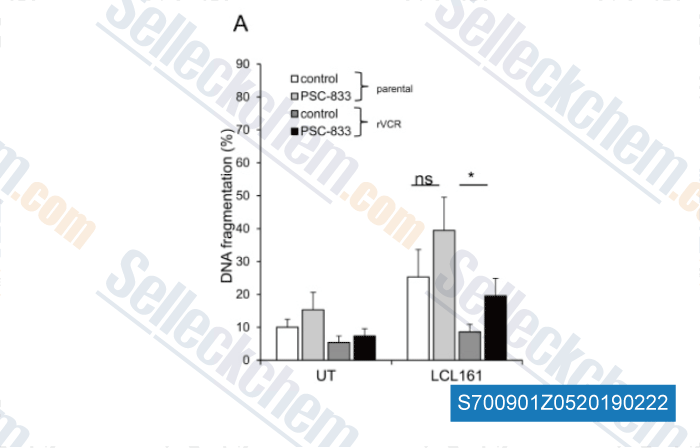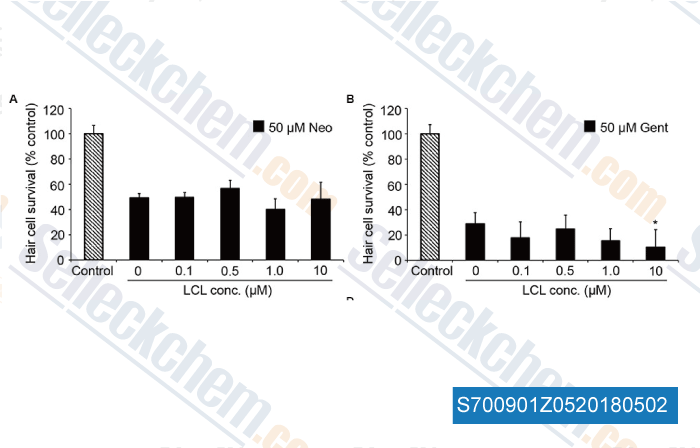|
How to Cite 1. For In-Text Citation (Materials & Methods): 2. For Key Resources Table: |
||
|
Toll Free: (877) 796-6397 -- USA and Canada only -- |
Fax: +1-832-582-8590 Orders: +1-832-582-8158 |
Tech Support: +1-832-582-8158 Ext:3 Please provide your Order Number in the email. We strive to reply to |
Technical Data
| Formula | C26H33FN4O3S |
||||||
| Molecular Weight | 500.63 | CAS No. | 1005342-46-0 | ||||
| Solubility (25°C)* | In vitro | DMSO | 100 mg/mL (199.74 mM) | ||||
| Ethanol | 100 mg/mL (199.74 mM) | ||||||
| Water | Insoluble | ||||||
| In vivo (Add solvents to the product individually and in order) |
|
||||||
|
* <1 mg/ml means slightly soluble or insoluble. * Please note that Selleck tests the solubility of all compounds in-house, and the actual solubility may differ slightly from published values. This is normal and is due to slight batch-to-batch variations. * Room temperature shipping (Stability testing shows this product can be shipped without any cooling measures.) |
|||||||
Preparing Stock Solutions
Biological Activity
| Description | LCL-161, a small molecule second mitochondrial activator of caspase (SMAC) mimetic, potently binds to and inhibits multiple IAPs (i.e. XIAP, c-IAP). | ||
|---|---|---|---|
| Targets |
|
||
| In vitro | LCL161 binds to inhibitors of apoptosis proteins (IAPs) with high affinity and initiates the destruction of cIAP1 and cIAP2, which further induces apoptosis via caspase activation. This compound modestly inhibits the growth of FLT3-ITD-expressing cells when administered alone, with an IC50 ranging from ~0.5 μM (Ba/F3-FLT3-ITD cells) to ~4 μM (MOLM13-luc+ cells). The potency of this agent against the D835Y mutant is observed to be considerably higher, with an IC50 of ~50 nM when tested against Ba/F3-D835Y cells. Treatment of MOLM13-luc+ cells with a combination of this compound and PKC412 leads to significantly more killing of cells than either agent alone, with Calcusyn combination indices suggestive of synergy. PKC412 and this chemical induces apoptosis of MOLM13-luc+ cells. The combination of PKC412 and this agent leads to a higher induction of apoptosis than either agent alone. It is able to override stromal-mediated rescue of mutant FLT3-expressing cells through positive combination with PKC412. This compound inhibits the growth of Ba/F3.p210 cells with an IC50 of ~100 nM. It also has demonstrated activity against drug-resistant cells expressing point mutations in the target proteins. This agent at 1000 nM is able to mostly or completely kill Ba/F3-derived cell lines conferring resistance to PKC412, which express FLT3-ITD harboring point mutations in the ATP-binding pocket of FLT3. It also shows activity at concentrations ranging from 100 to 1000 nM against Ba/F3 cells expressing various. This compound is evaluated against the 23 cell lines in the Pediatric Preclinical Testing Program (PPTP) in vitro panel using 96 hr. It achieves 50% growth inhibition against only 3 of the 23 tested PPTP cell lines under concentration of 10 μM. The three cell lines includes two T-cell ALL cell lines (COG-LL-317 and CCRF-CEM) and an anaplastic large cell lymphoma cell line (Karpas-299), with CCRF-CEM and Karpas-299 showing the lowest relative IC50 values (0.25 and 1.6 μM, respectively). It shows immunomodulatory properties on human immune subsets. T lymphocytes treated with this compound demonstrates significantly enhanced cytokine secretion upon activation, with little effect on CD4 and CD8 T-cell survival or proliferation. This agent treatment of peripheral blood mononuclear cells significantly enhances priming of naïve T cells with synthetic peptides in vitro. Myeloid dendritic cells undergoes phenotypic maturation upon this chemical and demonstrates a reduced capacity to cross-present a tumor antigen-based vaccine. These effects are potentially mediated through an observed activation of the canonical and non-canonical NF-κB pathways, following this compound with a resulting upregulation of anti-apoptotic molecules. |
||
| In vivo | LCL161 significantly enhances the ability of PKC412 to inhibit the growth of Ba/F3-FLT3-ITD-luc+ cells in vivo. This compound is also shown to positively combine with the standard chemotherapeutic agents, Ara-c and doxorubicin, against FLT3-ITD-expressing cells and against D835Y-expressing cells. There is an additive effect achieved by combining both this chemical in suppressing leukemia growth. This agent (100 mg/kg) enhances in vivo effects of high-moderate doses on leukemia burden in mice. This compound is tested against the Pediatric Preclinical Testing Program (PPTP) in vivo panels (30 or 75 mg/kg [solid tumors] or 100 mg/kg [ALL]) administered orally twice in a week. It induces significant differences in EFS distribution in approximately one-third of solid tumor xenografts (osteosarcoma and glioblastoma), but not in ALL xenografts. No objective tumor responses are observed. In vivo this chemical demonstrates limited single agent activity against the pediatric preclinical models studied. |
Protocol (from reference)
| Cell Assay: |
|
|---|---|
| Animal Study: |
|
References
|
Customer Product Validation

-
Data from [ , , Cancer Lett, 2018, 440-441:126-134 ]

-
Data from [ , , Front Cell Neurosci, 2017, https://doi.org/10.3389/fncel.2017.00326 ]
Selleck's LCL161 Has Been Cited by 48 Publications
| Single-cell transcriptomic and functional studies identify glial state changes and a role for inflammatory RIPK1 signaling in ALS pathogenesis [ Immunity, 2025, 58(4):961-979.e8] | PubMed: 40132594 |
| Ferroptosis-activating metabolite acrolein antagonizes necroptosis and anti-cancer therapeutics [ Nat Commun, 2025, 16(1):4919] | PubMed: 40425585 |
| Targeting cIAP2 in a novel senolytic strategy prevents glioblastoma recurrence after radiotherapy [ EMBO Mol Med, 2025, 10.1038/s44321-025-00201-x] | PubMed: 39972068 |
| Astrocytes and the tumor microenvironment inflammatory state dictate the killing of glioblastoma cells by Smac mimetic compounds [ Cell Death Dis, 2024, 15(8):592] | PubMed: 39147758 |
| Combination of bazedoxifene with chemotherapy and SMAC-mimetics for the treatment of colorectal cancer [ Cell Death Dis, 2024, 15(4):255] | PubMed: 38600086 |
| Complex IIa formation and ABC transporters determine sensitivity of OSCC to Smac mimetics [ Cell Death Dis, 2024, 15(11):855] | PubMed: 39578442 |
| SPOP-mediated RIPK3 destabilization desensitizes LPS/sMAC/zVAD-induced necroptotic cell death [ Cell Mol Life Sci, 2024, 81(1):451] | PubMed: 39540935 |
| A comparative study of apoptosis, pyroptosis, necroptosis, and PANoptosis components in mouse and human cells [ PLoS One, 2024, 19(2):e0299577] | PubMed: 38412164 |
| Single-molecule fingerprinting of protein-drug interaction using a funneled biological nanopore [ Nat Commun, 2023, 14(1):1461] | PubMed: 37015934 |
| Dimethyl fumarate inhibits necroptosis and alleviates systemic inflammatory response syndrome by blocking the RIPK1-RIPK3-MLKL axis [ Pharmacol Res, 2023, 189:106697] | PubMed: 36796462 |
RETURN POLICY
Selleck Chemical’s Unconditional Return Policy ensures a smooth online shopping experience for our customers. If you are in any way unsatisfied with your purchase, you may return any item(s) within 7 days of receiving it. In the event of product quality issues, either protocol related or product related problems, you may return any item(s) within 365 days from the original purchase date. Please follow the instructions below when returning products.
SHIPPING AND STORAGE
Selleck products are transported at room temperature. If you receive the product at room temperature, please rest assured, the Selleck Quality Inspection Department has conducted experiments to verify that the normal temperature placement of one month will not affect the biological activity of powder products. After collecting, please store the product according to the requirements described in the datasheet. Most Selleck products are stable under the recommended conditions.
NOT FOR HUMAN, VETERINARY DIAGNOSTIC OR THERAPEUTIC USE.
